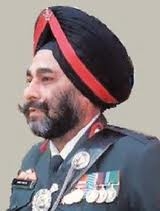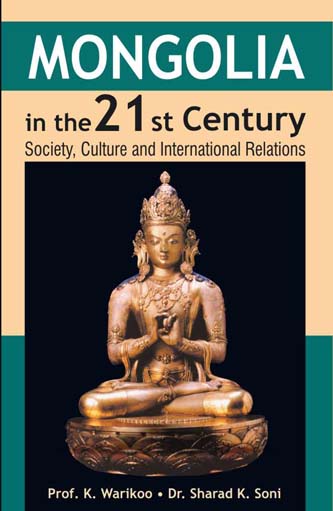Mongolia in the 21st Century : Society, Culture & International Relations
| Author | : | K. Warikoo, Sharad K. Soni |
| Year of Publication | : | 2010 |
| Publisher | : | Pentagon Press |
| ISBN - 13 | : | 9788182744851 |
| Edition | : | First |
| Language | : | English |
| Binding | : | Hardcover |
| Subject | : | Asian Studies |
About the Book :
Bordered by Siberia in the north and Gobi desert in the
south and surrounded by two powerful neighbours-Russia and China, Mongolia has
had a peculiar geo-strategic situation of being land-locked. Its location at
the crossroads of Central Asia, North East Asia, Far East, China and Russia
further enhances the importance of Mongolia. Mongolia is the seventh largest
country in Asia in terms of its territory but population wise it is one of the
smallest. The Mongol expansion under Chinggis Khan left a significant impact of
the nomadic peoples of Inner Asia on the sedentary world.
At the turn of the twenty first century, Mongolia has been trying to overcome
its geographical disadvantage of being a landlocked state and is striving to
open itself to the outside world despite being surrounded by two giant
powers-Russia and China. Moreover, in the post-Cold War security environment of
Mongolia, bilateral and multilateral cooperation has become the key factor of
regional dynamism in the Asia-Pacific. With the collapse of the USSR and the
end of the Cold War, the geopolitical situation of Mongolia was altered.
Mongolia now seeks to ensure the security of its own existence by strictly
observing the policy of not allowing the use of the country`s territory against
other States, ensuring its Nuclear-Weapon-Free-Zone status at the international
level and making it an important element of strengthening the country`s
security by political means. China, on the other hand, wants to build up its
power base in North East Asia.
About Author :
Prof. K. Warikoo is Director, Central Asian Studies Programme, School of International Studies, Jawaharlal Nehru University, New Delhi. He is the Secretary General (Hon`y) of Himalayan Research and Cultural Foundation, and Founder Editor, Himalayan and Central Asian Studies, a quarterly journal published since 1997. His major publications include Cultural Heritage of Kashmiri Pandits (Co-Editor) (New Delhi, 2009); Himalayan Frontiers of India (Editor) (UK, US and Canada, Routledge, 2009); Cultural Heritage of Jammu and Kashmir (Editor) (New Delhi, 2009); Central Asia since Independence (Editor) (New Delhi, 2004) and Afghanistan: The Challenge (Editor) (New Delhi, 2007); Bamiyan: Challenge to World Heritage (Editor) (New Delhi, 2002); The Afghanistan Crisis: Issues and Perspectives (Editor) (New Delhi, 2002); Gujjars of Jammu and Kashmir (Editor) (Bhopal, 2001); Jammu, Kashmir and Ladakh: Linguistic Predicament (Co-Editor) (New Delhi 1996); Society and Culture in the Himalayas (Editor) (New Delhi 1995); Central Asia: Emerging New Order (Editor) (New Delhi, 1995); Ethnicity and Politics in Central Asia (Co-Editor) (New Delhi, 1992); Central Asia and Kashmir: A Study in the Context of Anglo-Russian Rivalry (New Delhi, 1989).
Dr. Sharad K. Soni teaches at Central Asian Studies Programme, School of International Studies, Jawaharlal Nehru University, New Delhi. He has specialized in Mongolian and Central Asian Studies with particular focus on Mongolia, Kazakhstan as well as Tibet and Inner Mongolia Autonomous Regions of China, besides Mongol culture areas in Siberian Republics of Tuva and Buryatia. He has been Visiting Researcher at the Mongolia Society and Department of Central Eurasian Studies, Indiana University, Bloomington, USA (2004); Visiting Faculty at the School of International Studies, Peking University, Beijing (2005-06) and Research Fellow, MaulanaAbulKalam Azad Institute of Asian Studies, Kolkata (1999-2006). A recipient of ASIA Fellows Award (2005-06) from Ford Foundation funded Asian Scholarship Foundation (ASF), Bangkok, Thailand, Dr. Soni has extensively travelled in Mongolia and China. He has also delivered lectures at different Universities in Astana and Almaty, Kazakhstan (2009). He is the Founder Member and Joint Secretary of the Association of Asia Scholars, an Asia wide network of ASF Alumni Fellows. His major publications include Modern Mongolia: A Concise History (New Delhi, 2006) [Co-author]; Mongolia-China Relations: Modern and Contemporary Times (New Delhi, 2006); Mongolia-Russia Relations: Kiakhta to Vladivostok, (Delhi, 2002); Reign of Terror in Mongolia, 1920-1990 (New Delhi, 1992) [Co-author].







